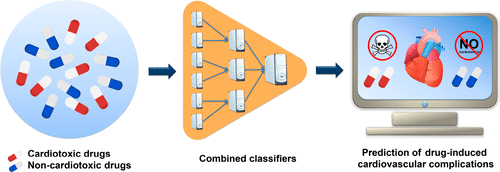当前位置:
X-MOL 学术
›
J. Chem. Inf. Model.
›
论文详情
Our official English website, www.x-mol.net, welcomes your
feedback! (Note: you will need to create a separate account there.)
In Silico Pharmacoepidemiologic Evaluation of Drug-Induced Cardiovascular Complications Using Combined Classifiers
Journal of Chemical Information and Modeling ( IF 5.6 ) Pub Date : 2018-04-30 00:00:00 , DOI: 10.1021/acs.jcim.7b00641 Chuipu Cai 1 , Jiansong Fang 1 , Pengfei Guo 1 , Qi Wang 1 , Huixiao Hong 2 , Javid Moslehi 3, 4 , Feixiong Cheng 5, 6
Journal of Chemical Information and Modeling ( IF 5.6 ) Pub Date : 2018-04-30 00:00:00 , DOI: 10.1021/acs.jcim.7b00641 Chuipu Cai 1 , Jiansong Fang 1 , Pengfei Guo 1 , Qi Wang 1 , Huixiao Hong 2 , Javid Moslehi 3, 4 , Feixiong Cheng 5, 6
Affiliation

|
Drug-induced cardiovascular complications are the most common adverse drug events and account for the withdrawal or severe restrictions on the use of multitudinous postmarketed drugs. In this study, we developed new in silico models for systematic identification of drug-induced cardiovascular complications in drug discovery and postmarketing surveillance. Specifically, we collected drug-induced cardiovascular complications covering the five most common types of cardiovascular outcomes (hypertension, heart block, arrhythmia, cardiac failure, and myocardial infarction) from four publicly available data resources: Comparative Toxicogenomics Database, SIDER, Offsides, and MetaADEDB. Using these databases, we developed a combined classifier framework through integration of five machine-learning algorithms: logistic regression, random forest, k-nearest neighbors, support vector machine, and neural network. The totality of models included 180 single classifiers with area under receiver operating characteristic curves (AUC) ranging from 0.647 to 0.809 on 5-fold cross-validations. To develop the combined classifiers, we then utilized a neural network algorithm to integrate the best four single classifiers for each cardiovascular outcome. The combined classifiers had higher performance with an AUC range from 0.784 to 0.842 compared to single classifiers. Furthermore, we validated our predicted cardiovascular complications for 63 anticancer agents using experimental data from clinical studies, human pluripotent stem cell-derived cardiomyocyte assays, and literature. The success rate of our combined classifiers reached 87%. In conclusion, this study presents powerful in silico tools for systematic risk assessment of drug-induced cardiovascular complications. This tool is relevant not only in early stages of drug discovery but also throughout the life of a drug including clinical trials and postmarketing surveillance.
中文翻译:

使用组合分类器对药物引起的心血管并发症进行计算机药物流行病学评估
药物引起的心血管并发症是最常见的药物不良事件,也是众多上市后药物停药或严格限制使用的原因。在这项研究中,我们开发了新的计算机模型,用于在药物发现和上市后监测中系统识别药物引起的心血管并发症。具体来说,我们从四个公开可用的数据资源中收集了药物引起的心血管并发症,涵盖五种最常见的心血管结局类型(高血压、心脏传导阻滞、心律失常、心力衰竭和心肌梗死):比较毒理学数据库、SIDER、Offsides 和 MetaADEDB 。使用这些数据库,我们通过集成五种机器学习算法开发了一个组合分类器框架:逻辑回归、随机森林、k最近邻、支持向量机和神经网络。模型总数包括 180 个单一分类器,在 5 倍交叉验证中,接收者操作特征曲线下面积 (AUC) 范围为 0.647 到 0.809。为了开发组合分类器,我们利用神经网络算法针对每种心血管结果整合最佳的四个单一分类器。与单个分类器相比,组合分类器具有更高的性能,AUC 范围为 0.784 至 0.842。此外,我们利用临床研究、人类多能干细胞衍生的心肌细胞测定和文献的实验数据验证了 63 种抗癌药物的预测心血管并发症。我们的组合分类器的成功率达到了 87%。总之,这项研究为药物引起的心血管并发症的系统风险评估提供了强大的计算机工具。该工具不仅适用于药物发现的早期阶段,而且适用于药物的整个生命周期,包括临床试验和上市后监测。
更新日期:2018-04-30
中文翻译:

使用组合分类器对药物引起的心血管并发症进行计算机药物流行病学评估
药物引起的心血管并发症是最常见的药物不良事件,也是众多上市后药物停药或严格限制使用的原因。在这项研究中,我们开发了新的计算机模型,用于在药物发现和上市后监测中系统识别药物引起的心血管并发症。具体来说,我们从四个公开可用的数据资源中收集了药物引起的心血管并发症,涵盖五种最常见的心血管结局类型(高血压、心脏传导阻滞、心律失常、心力衰竭和心肌梗死):比较毒理学数据库、SIDER、Offsides 和 MetaADEDB 。使用这些数据库,我们通过集成五种机器学习算法开发了一个组合分类器框架:逻辑回归、随机森林、k最近邻、支持向量机和神经网络。模型总数包括 180 个单一分类器,在 5 倍交叉验证中,接收者操作特征曲线下面积 (AUC) 范围为 0.647 到 0.809。为了开发组合分类器,我们利用神经网络算法针对每种心血管结果整合最佳的四个单一分类器。与单个分类器相比,组合分类器具有更高的性能,AUC 范围为 0.784 至 0.842。此外,我们利用临床研究、人类多能干细胞衍生的心肌细胞测定和文献的实验数据验证了 63 种抗癌药物的预测心血管并发症。我们的组合分类器的成功率达到了 87%。总之,这项研究为药物引起的心血管并发症的系统风险评估提供了强大的计算机工具。该工具不仅适用于药物发现的早期阶段,而且适用于药物的整个生命周期,包括临床试验和上市后监测。










































 京公网安备 11010802027423号
京公网安备 11010802027423号